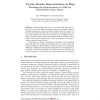Free Online Productivity Tools
i2Speak
i2Symbol
i2OCR
iTex2Img
iWeb2Print
iWeb2Shot
i2Type
iPdf2Split
iPdf2Merge
i2Bopomofo
i2Arabic
i2Style
i2Image
i2PDF
iLatex2Rtf
Sci2ools
DSL
2009
2009
Varying Domain Representations in Hagl
Abstract. Experimental game theory is an increasingly important research tool in many fields, providing insight into strategic behavior through simulation and experimentation on game theoretic models. Unfortunately, despite relying heavily on automation, this approach has not been well supported by tools. Here we present our continuing work on Hagl, a domain-specific language embedded in Haskell, intended to drastically reduce the development time of such experiments and support a highly explorative research style. In this paper we present a fundamental redesign of the underlying game representation in Hagl. These changes allow us to better utilize domain knowledge by allowing different classes of games to be represented differently, exploiting existing domain representations and algorithms. In particular, we show how this supports analytical extensions to Hagl, and makes strategies for state-based games vastly simpler and more efficient.
DSL 2009 | Explorative Research Style | Game Theoretic Models | Important Research Tool | Programming Languages |
| Added | 17 Feb 2011 |
| Updated | 17 Feb 2011 |
| Type | Journal |
| Year | 2009 |
| Where | DSL |
| Authors | Eric Walkingshaw, Martin Erwig |
Comments (0)

